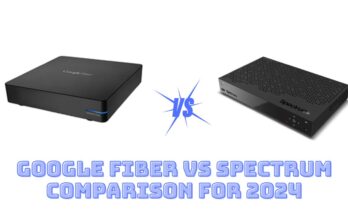In the current digital era, a reliable and fast internet connection is essential for both work and leisure. Millions of netizens across the United States rely on Top Internet Plans’s annual speed test results to gauge the state of the nation’s internet infrastructure. This report explores the fastest internet provider services in the United States in 2023, shedding light on how industry developments, technological advancements, and the global COVID-19 pandemic have shaped internet speeds. You can also compare and choose the most effective internet plans with one of the top internet providers i.e., Top Internet Plans. Additionally, we examine whether it’s time to update federal broadband internet standards to 100Mbps. This report is divided into two sections, each addressing a key question.
What are the Fastest Internet Providers Right Now?
Top Internet Plans utilizes its integrated speed score (ISS) to rank internet providers based on average download and upload speeds. The data is collected from 4.5 million speed tests conducted between January 9, 2022, and January 9, 2023.
Google Fiber – Leading the Pack
Google Fiber emerges as the fastest internet provider in the United States, securing an integrated speed score (ISS) of 176.16. Google Fiber’s average download speeds of 176.19Mbps over the past year set the benchmark for high-speed internet. Despite being available in only 19 cities, Google Fiber has consistently outperformed competitors since 2018, offering maximum advertised speeds of up to 8,000Mbps with portable WiFi hotspots.
Verizon Home Internet
Verizon Home Internet claims the second position with an ISS of 160.37 and maximum advertised speeds of 1,500-2,300Mbps.
Xfinity
Xfinity, Cox, and Metronet follow closely in third, fourth, and fifth place, respectively, with Xfinity achieving an ISS of 158.68 and offering speeds up to 1,200Mbps.
Cox Communications
Cox Communications ranks fourth with an ISS of 150.40 and speeds of up to 1,000Mbps.
MetroNet
MetroNet secures fifth place with an ISS of 150.32, offering blazing-fast speeds of 5,000Mbps.
These results showcase the competitive landscape of high-speed home internet providers, with regional players also making significant strides.
Regional Internet Providers Making Waves
While major providers like Verizon Fios and Xfinity lead nationally, several regional and local providers are making their mark with impressive speeds. The data for this section is based on speed tests conducted between April 1, 2022, and April 1, 2023.
1. Altamaha Fiber – The Regional Leader
Altamaha Fiber, based in Lyons, Georgia, emerges as the fastest regional provider with an impressive ISS of 250.78. Offering speeds of up to 2,500Mbps, Altamaha Fiber serves parts of east central Georgia.
2. WeLink
WeLink, with an ISS of 271.59, ranks second and provides speeds of up to 1,000Mbps in Phoenix, AZ; Las Vegas, NV; Henderson, NV; Tucson, AZ; and Washington, DC.
3. FlashFiber
FlashFiber, serving Lawrence and Moulder Counties, AL, secures third place with an ISS of 243.09 and speeds of up to 2,000Mbps.
4. Wyyerd Fiber
Wyyerd Fiber, operating in Cherokee County, Texas, ranks fourth with an ISS of 258.33 and speeds of up to 2,000Mbps.
5. Ting Fiber
Ting Fiber serves 13 cities across California, Colorado, Idaho, Maryland, North Carolina, and Virginia, securing fifth place with an ISS of 230.26 and offering speeds of up to 1,000Mbps.
The success of these regional providers highlights the growing importance of local internet companies, delivering faster speeds and personalized customer service in underserved areas.
Fastest Internet Providers in the United States (April 2022–April 2023)
| Rank | Internet Provider | Integrated Speed Score (ISS) | Maximum Advertised Speed |
| 1. | Google Fiber | 176.6 | Up to 8000 Mbps |
| 2. | Verizon Home Internet | 160.37 | 1500 to 2300 Mbps |
| 3. | Xfinity | 158.68 | Up to 1200 Mbps |
| 4. | Cox Communications | 150.40 | 1000 Mbps |
| 5. | MetroNet | 150.32 | 5000 Mbps |
Is 100Mbps Still a Relevant Benchmark?
The Federal Communications Commission (FCC) has proposed updating federal broadband internet standards to 100Mbps. However, the data presented in this report suggests that many Americans are already enjoying speeds well beyond this proposed benchmark. The availability of internet service providers offering speeds ranging from 1,000Mbps to 10,000Mbps showcases the rapid advancements in internet infrastructure.
Final Words
In 2023, the United States will be home to some of the fastest internet provider services in the world, with Google Fiber leading the charge. Regional providers are also making significant contributions to high-speed internet access, particularly in underserved areas. As the internet continues to evolve and improve, the need for speed remains paramount. While the FCC’s proposed 100Mbps benchmark may have been relevant in the past, the data suggests that Americans are already enjoying much faster internet speeds. The future of internet connectivity holds even greater promise, with providers continually pushing the boundaries of what is possible.
It’s clear that the race for faster internet is ongoing, and consumers are the ultimate beneficiaries of this competition. Whether you’re a city dweller enjoying gigabit speeds or a rural resident benefiting from regional providers, the need for high-speed internet is here to stay.



